-
 Bitcoin
Bitcoin $114400
0.68% -
 Ethereum
Ethereum $3550
2.48% -
 XRP
XRP $3.001
4.99% -
 Tether USDt
Tether USDt $0.9999
0.01% -
 BNB
BNB $757.6
1.46% -
 Solana
Solana $162.9
1.07% -
 USDC
USDC $0.9998
0.00% -
 TRON
TRON $0.3294
0.91% -
 Dogecoin
Dogecoin $0.2015
2.46% -
 Cardano
Cardano $0.7379
2.01% -
 Stellar
Stellar $0.4141
8.83% -
 Hyperliquid
Hyperliquid $37.83
-1.91% -
 Sui
Sui $3.454
0.76% -
 Chainlink
Chainlink $16.62
3.53% -
 Bitcoin Cash
Bitcoin Cash $554.6
2.84% -
 Hedera
Hedera $0.2486
3.91% -
 Ethena USDe
Ethena USDe $1.001
0.00% -
 Avalanche
Avalanche $21.95
3.34% -
 Toncoin
Toncoin $3.563
-2.85% -
 Litecoin
Litecoin $112.7
2.65% -
 UNUS SED LEO
UNUS SED LEO $8.977
0.13% -
 Shiba Inu
Shiba Inu $0.00001232
1.85% -
 Uniswap
Uniswap $9.319
2.93% -
 Polkadot
Polkadot $3.632
1.38% -
 Monero
Monero $307.2
2.36% -
 Dai
Dai $0.9997
-0.03% -
 Bitget Token
Bitget Token $4.340
0.91% -
 Pepe
Pepe $0.00001048
1.07% -
 Cronos
Cronos $0.1348
3.26% -
 Aave
Aave $261.5
1.93%
What are the gas fees for DeFi ETFs? How to reduce gas fees?
Gas fees in DeFi ETFs, transactional costs for executing decentralized finance operations on blockchains, are influenced by factors like network traffic, transaction complexity, and chain congestion.
Jan 08, 2025 at 03:24 am
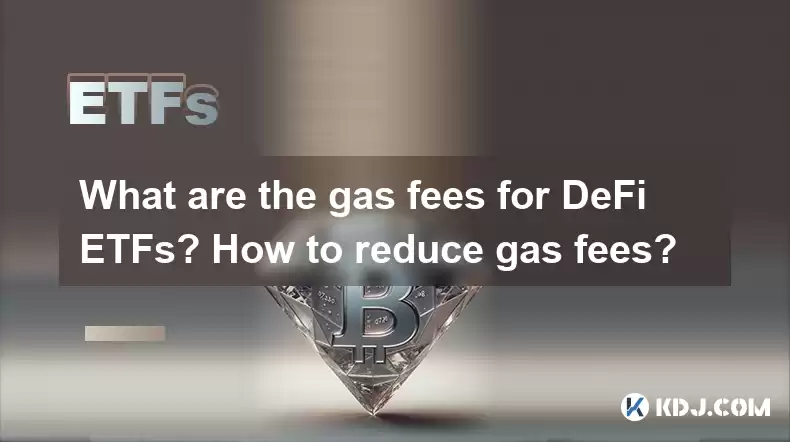
Key Points:
- Understanding Gas Fees in DeFi ETFs
- Factors Influencing Gas Fees
- Strategies to Reduce Gas Fees
- Best Practices for Optimizing Gas Costs
Understanding Gas Fees in DeFi ETFs:
Gas fees in DeFi ETFs are transactional costs paid to miners or validators for executing decentralized finance (DeFi) operations on a blockchain network. These fees are a compensation for the computational resources utilized in processing transactions, including data storage, recordkeeping, and computations.
Factors Influencing Gas Fees:
- Network Traffic: Higher network activity, characterized by increased transaction volume, generally correlates with higher gas fees.
- Transaction Complexity: Transactions involving complex operations, such as smart contract interactions or token swaps, require more computational effort and thus attract higher gas costs.
- Chain Congestion: Periods of excessive network usage can lead to blockchain congestion, resulting in delayed transactions and elevated gas fees.
- Block Reward: The reward miners or validators receive for adding blocks to the blockchain partly determines gas fees. Fluctuations in block reward can impact gas prices.
Strategies to Reduce Gas Fees:
- Choose Low-Traffic Hours: Transacting during periods of reduced network activity, such as late nights or weekends, may lower gas costs.
- Estimate and Compare Gas Fees: Many DeFi platforms and tools allow users to estimate gas fees for proposed transactions. Comparing these estimates across different times or platforms can help identify lower-cost options.
- Use Gas-Efficient Blockchains: Opting for DeFi protocols built on blockchains known for lower transaction fees, such as Polygon or Avalanche, can significantly reduce gas expenses.
- Batch Transactions: Grouping multiple transactions into a single batch instead of executing them separately can optimize gas usage by leveraging economies of scale.
- Consider Meta Transactions: Some DeFi protocols implement meta transactions, where gas fees are paid on behalf of users. This can eliminate gas fees for end users, improving transaction affordability.
Best Practices for Optimizing Gas Costs:
- Utilize Optimized Protocols: Seek out DeFi ETFs that incorporate gas optimization features, such as gasless or low-gas protocols, to minimize transaction costs.
- Leverage DeFi Aggregators: Platforms that aggregate multiple DeFi services, like 1inch or Paraswap, often offer gas-optimized swap and routing solutions, reducing overall fees.
- Monitor Gas Price Predictors: Tools like GasNow or EthGasStation provide insights into historical and current gas prices, enabling users to make informed decisions about gas fee timing.
FAQs:
Q: How much do gas fees vary for DeFi ETFs?
A: Gas fees fluctuate depending on network conditions and transaction complexity, ranging from a few cents to several dollars or more.
Q: What types of DeFi operations have the highest gas fees?
A: Complex operations involving smart contract interactions or token swaps, as they require more computational effort to execute.
Q: Is there a way to predict gas fees?
A: Gas price predictors provide estimates based on historical data and current network activity, but predictions can be influenced by sudden changes in traffic.
Q: Can I reduce gas fees by using stablecoins?
A: Stablecoin transactions often have lower gas fees compared to other cryptocurrencies due to their less complex nature.
Q: What are the advantages of meta transactions in reducing gas costs?
A: Meta transactions allow users to initiate transactions without paying gas fees directly, as the fees are covered by third-party relayers.
Disclaimer:info@kdj.com
The information provided is not trading advice. kdj.com does not assume any responsibility for any investments made based on the information provided in this article. Cryptocurrencies are highly volatile and it is highly recommended that you invest with caution after thorough research!
If you believe that the content used on this website infringes your copyright, please contact us immediately (info@kdj.com) and we will delete it promptly.
- Cryptocurrency, Altcoins, and Profit Potential: Navigating the Wild West
- 2025-08-04 14:50:11
- Blue Gold & Crypto: Investing Disruption in Precious Metals
- 2025-08-04 14:30:11
- Japan, Metaplanet, and Bitcoin Acquisition: A New Era of Corporate Treasury?
- 2025-08-04 14:30:11
- Coinbase's Buy Rating & Bitcoin's Bold Future: A Canaccord Genuity Perspective
- 2025-08-04 14:50:11
- Coinbase's Buy Rating Maintained by Rosenblatt Securities: A Deep Dive
- 2025-08-04 14:55:11
- Cryptos, Strategic Choices, High Returns: Navigating the Meme Coin Mania
- 2025-08-04 14:55:11
Related knowledge

What role does SEC play in Bitcoin ETF approval?
Feb 25,2025 at 06:48am
Key Points:SEC's Role in Bitcoin ETF Approval ProcessHistorical Efforts to Establish a Bitcoin ETFSEC's Criteria for Bitcoin ETF ApprovalPotential Imp...
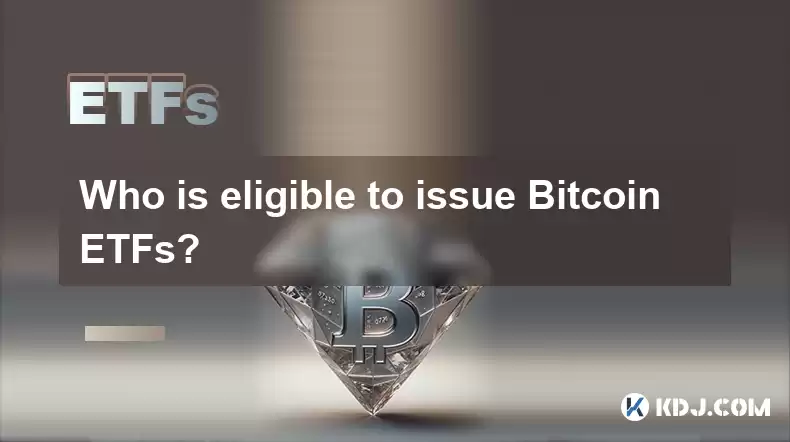
Who is eligible to issue Bitcoin ETFs?
Feb 25,2025 at 11:13am
Key Points:Only regulated financial institutions with the necessary expertise and infrastructure are eligible to issue Bitcoin ETFs.The Securities and...
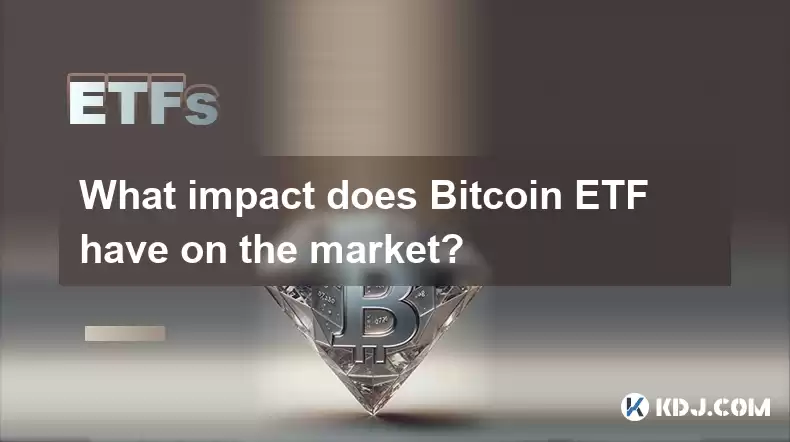
What impact does Bitcoin ETF have on the market?
Feb 25,2025 at 11:37am
Key Points:Introduction to Bitcoin ETFs and their role in the cryptocurrency marketHistorical development and performance of Bitcoin ETFsPotential ben...
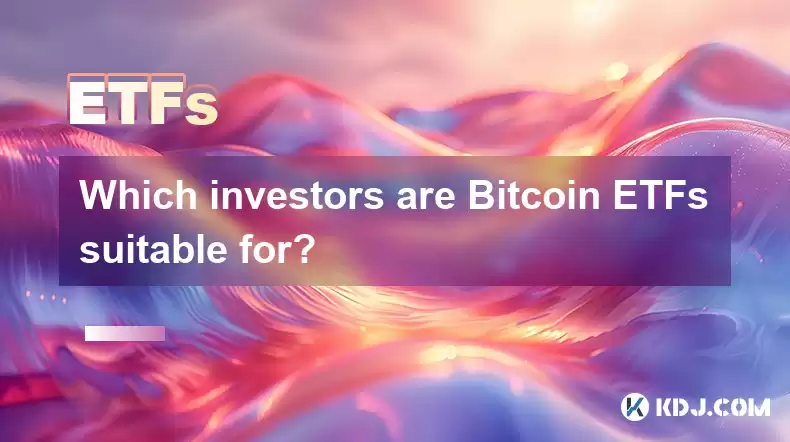
Which investors are Bitcoin ETFs suitable for?
Feb 27,2025 at 04:01pm
Key Points:Understanding Bitcoin ETFsBenefits of Bitcoin ETFsSuitability of Bitcoin ETFs for Different InvestorsAssessing Risk Tolerance and Investmen...
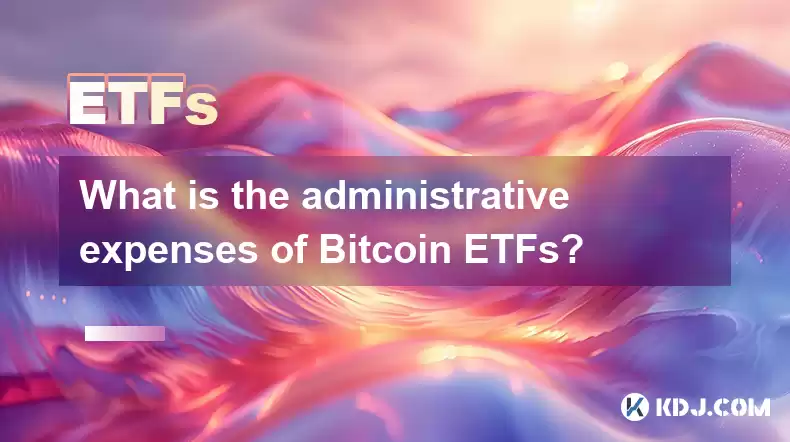
What is the administrative expenses of Bitcoin ETFs?
Feb 26,2025 at 12:24am
Key Points:Administrative expenses are a crucial factor to consider when evaluating Bitcoin ETFs.These expenses can significantly impact the performan...
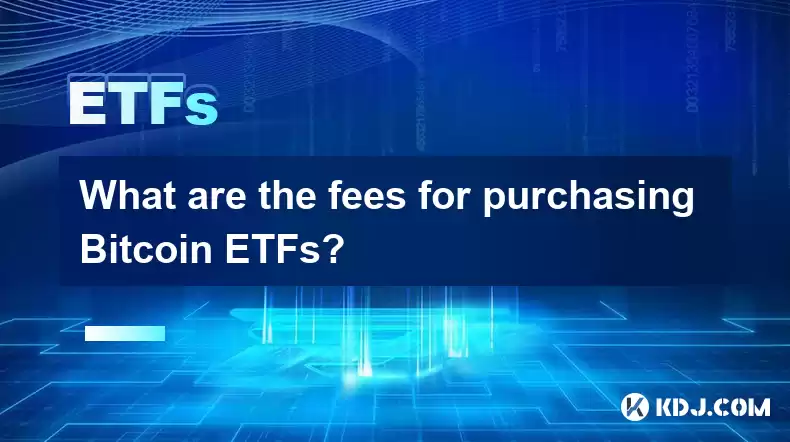
What are the fees for purchasing Bitcoin ETFs?
Feb 27,2025 at 07:13pm
Key Points:Bitcoin exchange-traded funds (ETFs) are a cost-effective and regulated way to gain exposure to Bitcoin.Fees associated with Bitcoin ETF pu...

What role does SEC play in Bitcoin ETF approval?
Feb 25,2025 at 06:48am
Key Points:SEC's Role in Bitcoin ETF Approval ProcessHistorical Efforts to Establish a Bitcoin ETFSEC's Criteria for Bitcoin ETF ApprovalPotential Imp...

Who is eligible to issue Bitcoin ETFs?
Feb 25,2025 at 11:13am
Key Points:Only regulated financial institutions with the necessary expertise and infrastructure are eligible to issue Bitcoin ETFs.The Securities and...

What impact does Bitcoin ETF have on the market?
Feb 25,2025 at 11:37am
Key Points:Introduction to Bitcoin ETFs and their role in the cryptocurrency marketHistorical development and performance of Bitcoin ETFsPotential ben...

Which investors are Bitcoin ETFs suitable for?
Feb 27,2025 at 04:01pm
Key Points:Understanding Bitcoin ETFsBenefits of Bitcoin ETFsSuitability of Bitcoin ETFs for Different InvestorsAssessing Risk Tolerance and Investmen...

What is the administrative expenses of Bitcoin ETFs?
Feb 26,2025 at 12:24am
Key Points:Administrative expenses are a crucial factor to consider when evaluating Bitcoin ETFs.These expenses can significantly impact the performan...

What are the fees for purchasing Bitcoin ETFs?
Feb 27,2025 at 07:13pm
Key Points:Bitcoin exchange-traded funds (ETFs) are a cost-effective and regulated way to gain exposure to Bitcoin.Fees associated with Bitcoin ETF pu...
See all articles

























































































